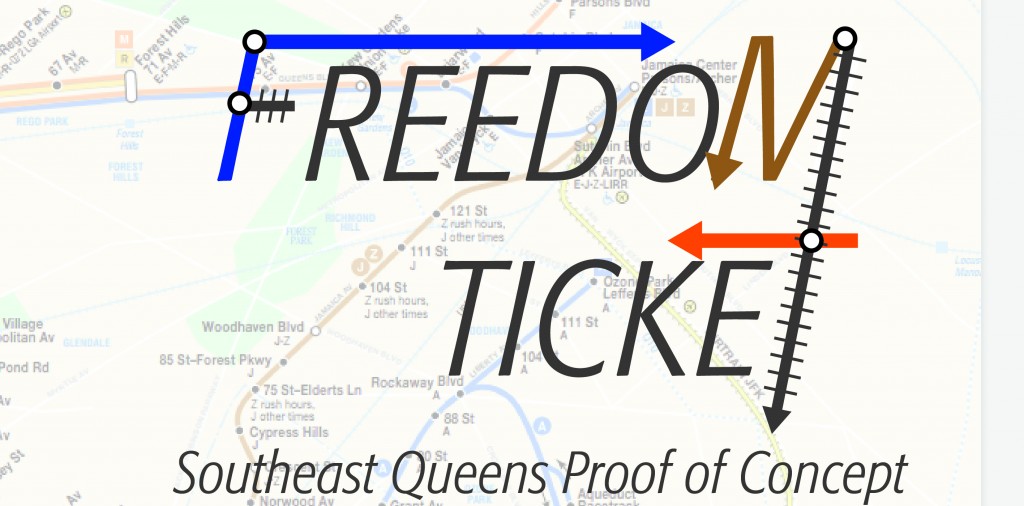The New York City Transit Rider Council held a press conference today to release its latest report: Freedom Ticket: Southeast Queens Proof of Concept.
See the Press Release here.
Find the Freedom Ticket report here.
New York City Transit Riders Council Calls for Freedom Ticket to Reduce Travel Time and Cost
The New York City Transit Riders Council (NYCTRC) today called on the Metropolitan Transportation Authority (MTA) to implement Freedom Ticket, a new fare option for travel inside New York City that permits riders to utilize and transfer to and from MTA services that best meets their needs. Implementing this fare would benefit thousands of City residents without convenient access to efficient public transportation.
The NYCTRC recommends implementing Freedom Ticket in a phased approach.
Phase 1 (2017): Southeast Queens Freedom Ticket Proof of Concept:
Riders face some of the longest commutes to Manhattan employment centers in New York City and rely on a patchwork of buses and commuter vans to access overburdened subway lines. The initial phase would provide valuable experience with the program and allow for adjustments before expansion.
Phase 2 (2019): Freedom Ticket expanded to targeted Metro-North and LIRR stations.
In Phase 2, Freedom ticket would be implemented in areas where NYC commuter railroad stations are .8 miles or more from the nearest subway station.
Phase 3 (2021): The third phase would implement Freedom Ticket throughout the City.
The NYCTRC analyzed available capacity on commuter rails and found that even during peak hours, sufficient empty seats are available for Freedom Ticket users at current service levels.
Even in morning and evening rush hour periods between Jamaica and Penn Station, where Long Island Rail Road passenger loads are the greatest, there are approximately 20,000 empty seats on trains operating in each of the rush hour periods.
Findings
SE Queens to Jamaica
34% of seats empty or 21,984 seats in the AM peak
39% of seats are empty or 23,136 seats in the PM peak
Jamaica to Penn Station
23% of seats are empty or 19,892 in the AM peak
26% of seats are empty or 20,014 in the PM peak
Jamaica to Atlantic Terminal
49% of seats are empty or 9,372 in the AM peak
60% of seats are empty or 11,104 in the PM peak
The benefits of implementing Freedom Ticket include:
- Reduced travel times in Southeast Queens neighborhoods with the longest commuting times.
- Trips diverted from already overburdened subway lines, accommodating future growth and development of outlying areas of New York City with existing unused capacity on commuter rail lines, and more efficiently using MTA assets with a minimum of additional capital or operating costs.
- NYCTRC recommends that the fare for Freedom Ticket be a maximum of the cost of an express bus fare, and that single ride, weekly and monthly options be available. At today’s fare levels, this translates to a base fare of $6.50, a weekly cost of $57.25, and a monthly cost of $215. These fares save riders between 49 and 36 percent over the existing cost of travel combining commuter rail and local transit.
SE Queens Proof of Concept Costs: $4.3 million
There will be revenue reductions from existing New York City commuter rail riders who change to the less expensive Freedom Ticket.
Revenue Gains: $1.5 m/1,000 from new riders filling empty seats
There will be revenue gains from riders changing from local buses and subways or private automobiles to Freedom Ticket. Additional revenue potential comes from riders changing from heavily subsidized travel modes, such as express buses, to more efficient commuter rail travel included in Freedom Ticket.
Financial Partnerships
A financial partnership between the MTA local governments in Freedom Ticket areas is integral to the Freedom Ticket concept. Just as the City of New York covers the cost of providing additional bus service in transit-underserved areas, the net costs of making more efficient transportation available to serve both existing residents and new growth and development can be met through a financial partnership with the City.
“Being able to use commuter rail within the City at a reasonable cost means real freedom for people in parts of the City that are underserved by transit. Freedom Ticket means real freedom for hundreds of thousands of city residents with some of the most difficult commutes in the city.” said NYCTRC Chair Andrew Albert.
